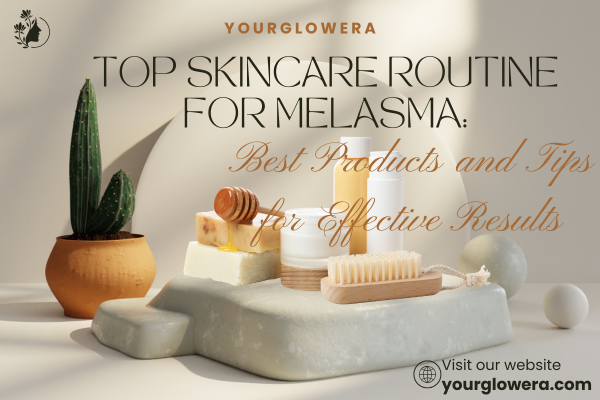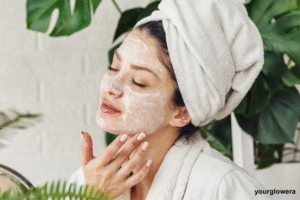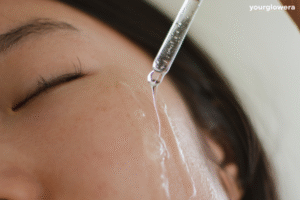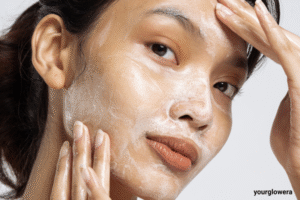Melasma is a common skin condition that leads to dark, discolored patches on the skin, typically on the face. Finding the right skincare routine for melasma is crucial in reducing these stubborn spots and achieving a clearer, even complexion.
If you’re dealing with melasma, you probably already know how difficult it can be to manage. But with the proper knowledge and the right products, you can improve your skin’s appearance and prevent the condition from worsening.
In this article, we’ll walk you through the best skincare routine for melasma, offering helpful advice on choosing the best products and treatments for results.
Table of Contents
1. What is Melasma and Why Does It Happen?
Melasma is a type of hyperpigmentation, where dark spots appear on the skin, usually on the forehead, cheeks, nose, and upper lip.
These spots are usually brown or grayish-brown in color and are most often caused by factors like hormonal fluctuations, sun exposure, and genetic predisposition, making a tailored skincare routine for melasma essential for treatment.
It is more common among women, especially during pregnancy or while taking birth control.
Understanding the root causes of melasma will help you identify the best skincare routine for melasma, including how to address the underlying triggers.

2.The Importance of Sun Protection in Your Melasma Skincare Regimen
One of the most essential steps in a skincare routine for melasma is protecting your skin from harmful UV rays. Sun exposure is a major trigger for melasma, and without proper sun protection, any treatment or product you use will be ineffective.
Always apply a broad-spectrum sunscreen with SPF 30 or higher every morning, even if you’re indoors, as UV rays can still penetrate through windows. Opt for a sunscreen that is designed for sensitive skin and doesn’t clog pores.
3. Cleansing: The Initial Step in Your Skincare Routine
Using a gentle, non-irritating cleanser is crucial for effectively managing melasma as part of a skincare routine for melasma. Cleansing helps remove dirt, excess oil, and impurities that can clog pores and exacerbate pigmentation.
Choose a gentle, sulfate-free cleanser to wash your skin while preserving its natural moisture.
A cleanser with antioxidants such as Vitamin C or E can also help to protect the skin from free radicals and reduce inflammation.
Product Recommendation: Look for gentle cleansers like CeraVe Hydrating Cleanser or Neutrogena Ultra Gentle Daily Cleanser.Both options are affordable and highly suitable for skin prone to melasma.
4. Exfoliation: Getting Rid of Dead Skin Cells
Exfoliation is another important part of your skincare routine for melasma. Exfoliating helps remove dead skin cells and promotes skin renewal, which can gradually lighten dark spots associated with melasma.
However, it’s important not to overdo it, as excessive exfoliation can irritate the skin and potentially worsen melasma.
To safely exfoliate, use a gentle chemical exfoliant containing AHAs (alpha-hydroxy acids) or BHAs (beta-hydroxy acids) once or twice a week.
Product Recommendation: Consider using The Ordinary Glycolic Acid 7% Toning Solution or Paula’s Choice Skin Perfecting 2% BHA Liquid Exfoliant. These products can provide gentle exfoliation without being too harsh on the skin.
5. Targeted Treatments: The Heart of Your Routine
When creating a skincare routine for melasma, incorporating targeted treatments that specifically address hyperpigmentation is key.
Look for products containing ingredients like Hydroquinone, Vitamin C, Retinoids, or Alpha Arbutin. Hydroquinone is a widely used skin-lightening agent that is effective in treating melasma by reducing the pigmentation and dark spots on the skin.
However, if you’re sensitive to Hydroquinone, you can opt for Vitamin C or Arbutin, which are milder alternatives in a skincare routine for melasma.
Product Recommendation: Ambi Skincare Fade Cream (contains Hydroquinone) and Melano CC Intensive Anti-Spot Essence (contains Vitamin C) are great options to target melasma spots effectively.

6. Moisturizing: Keeping Your Skin Hydrated
Moisturizing is an often-overlooked part of the skincare routine for melasma, but it’s just as important. Hydrated skin helps to maintain the skin’s barrier function, which can prevent irritation from other treatments.
Choose a lightweight, non-comedogenic moisturizer that suits your skin type.
Product Recommendation: For dry or combination skin, CeraVe Daily Moisturizing Lotion is a great option. If you have oily skin, try Neutrogena Hydro Boost Water Gel, which is oil-free and provides long-lasting hydration.
7. Night Treatments: Repair and Restore
Nighttime is when your skin has a chance to repair itself. Incorporate products containing active ingredients like Retinol, Vitamin C, or Niacinamide into your skincare routine to help brighten dark spots and promote cell turnover while you sleep.
Retinol, in particular, is excellent for promoting collagen production and reducing hyperpigmentation over time as part of an effective skincare routine for melasma.
Product Recommendation: Differin Gel (a prescription-strength Retinoid) or The Ordinary Retinol 0.2% in Squalane are effective options for nighttime use.
8. Be Consistent with Your Routine
Consistency is the essential factor for success with any skincare routine for melasma, especially when treating melasma. Patience is crucial, as it may take several weeks or even months to notice significant improvements..
Melasma doesn’t fade overnight, so it’s important to stick with your routine and not get discouraged.
Avoid switching products too often, as this can disrupt your skin’s healing process.
9. Lifestyle Tips to Support Your Skincare Routine
In addition to a well-rounded skincare routine for melasma, adopting a healthy lifestyle can support your skin’s health.
This includes getting enough sleep, staying hydrated, eating a balanced diet rich in antioxidants, and managing stress levels.
A healthy lifestyle can enhance the effectiveness of your skincare products and promote overall skin health.
10. When to See a Dermatologist
If your melasma persists or worsens despite following a consistent skincare routine, it may be time to see a dermatologist.
They can prescribe stronger treatments, such as oral medications or laser therapy, that can help treat stubborn melasma as part of an effective skincare routine for melasma.
A dermatologist will also help rule out other skin conditions that may look similar to melasma but require different treatments.

Conclusion
Melasma can be challenging, but with the right skincare routine, it’s possible to reduce dark spots and achieve clearer, more even-toned skin.
Always remember to protect your skin from the sun, use gentle products, and incorporate ingredients that target hyperpigmentation.
Maintain your routine consistently and exercise patience, as visible results can take time. If necessary, don’t hesitate to seek personalized guidance from a dermatologist.
With the right approach, you’ll be well on your way to managing melasma and achieving the skin you’ve always wanted.
If you’re looking for a complete skincare routine to address combination skin, be sure to check out our new post on the “Top Skincare Kit for Combination Skin: A Complete Guide to Healthy, Glowing Skin”. It offers practical tips and budget-friendly solutions to balance your T-zone and dry areas, helping you achieve healthy, glowing skin.
For those also dealing with melasma, our Top Skincare Routine for Melasma blog post provides the best products and tips for effective results, making it a must-read for a comprehensive skincare approach.
Frequently Asked Questions
Is vitamin C serum good for melasma?
Yes, Vitamin C serum is great for reducing melasma by brightening dark spots and preventing further pigmentation.
What is the fastest way to cure melasma on face?
The fastest way involves using sunscreen daily, applying topical treatments like hydroquinone, retinoids, and vitamin C, and considering laser treatments for quicker results.
Is hyaluronic acid good for melasma?
While it doesn’t treat melasma directly, hyaluronic acid is great for hydrating the skin, which is important when using treatments for pigmentation.
How I healed my melasma naturally?
Natural remedies like aloe vera, turmeric, and vitamin C-rich foods may help reduce melasma, but professional treatments offer more reliable results.
Does melasma mean boy or girl?
Melasma affects both men and women, but it’s more common in women, especially during pregnancy or when using birth control.
What skincare products are good for melasma?
Look for products with ingredients like hydroquinone, niacinamide, retinoids, vitamin C, and sunscreen for effective melasma treatment.
What not to use with melasma?
Avoid harsh exfoliants, alcohol-based toners, and strong acne treatments like benzoyl peroxide, which can irritate and worsen melasma.
Is AHA and BHA good for melasma?
Yes, AHAs and BHAs are helpful for exfoliating the skin and promoting the fading of melasma by speeding up cell turnover.
What is the best sunscreen for melasma?
A broad-spectrum sunscreen with an SPF of 30 or higher is essential. Look for one with physical blockers like zinc oxide or titanium dioxide.
How can I stop melasma permanently?
Permanent prevention involves consistent use of sunscreen, avoiding triggers like hormonal changes or heat, and undergoing regular treatments like lasers or chemical peels.
What causes melasma and how can a skincare routine help?
Melasma is commonly caused by hormonal changes, sun exposure, and genetic predisposition. A targeted skincare routine for melasma can help reduce pigmentation, control breakouts, and prevent further discoloration.
How long does it take to see results with a skincare routine for melasma?
Results can vary, but most people start seeing improvements in 4-6 weeks. Full results might take a few months, so consistency is key when following a melasma treatment routine.
What are the best ingredients for treating melasma?
Key ingredients include Hydroquinone, Vitamin C, Niacinamide, Retinol, and Arbutin. These help brighten the skin, reduce hyperpigmentation, and promote cell turnover.
Can sunscreen help with melasma?
Yes, sunscreen is essential for managing melasma. Sun exposure can worsen pigmentation, so applying a broad-spectrum sunscreen with SPF 30 or higher daily is critical to protect your skin and prevent further darkening.









Leave a reply